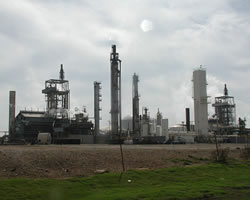Govt urged to lift fertiliser export ban

market, an official said on Friday.
Government suspended fertiliser exports to curtail shortages in the local market at the height of Zimbabwe’s economic challenges a few years ago.
Fertiliser production has, however, since surpassed local demand as the sector gradually recovers on the back of the prevailing macro-economic stability.
Under the current regulations fertiliser firms are required to obtain special permits from Government before exporting.
Windmill (Private) Limited chief executive Mr George Rundogo said fertiliser companies were sitting on accumulating stocks owing to low domestic uptake.
“Fertiliser companies are fully prepared to meet local demand,” Mr Rundogo said.
“There is well in excess of what is required by the local market but we still have to first get permits before we can export.”
Before the ban was imposed, Zimbabwe used to export to Malawi and Zambia among other markets in the region.
Windmill alone, Mr Rundogo said, had about 30 000 tonnes of fertiliser in stock which local demand was failing to take up.
He said accessing export markets was critical in revitalising fertiliser companies, which are struggling to recover from the economic contraction of the past decade.
“Fertiliser companies really need to start exporting to stay afloat, as right now we are sitting on idle stocks,” Mr Rundogo said, noting that Windmill could single-handedly satisfy this season’s winter requirements, estimated at about 40 000 tonnes.
He said local companies had the capacity to produce fertilisers to meet the region’s distinct requirements.
“We can produce the quality and type of fertilisers needed by neighbouring countries,” Mr Rundogo said.
Last year, the country’s four largest fertiliser firms, namely Windmill, Zimphos, Sable Chemicals and the Zimbabwe Fertiliser Company secured US$50 million from regional financiers to boost production.
As production soars above local demand, unlocking export markets would be critical for fertiliser companies to stay afloat.
Local demand for fertiliser has been low largely due to the prevailing liquidity crunch in the country.
In October last year, Zimbabwe Fertiliser Company managing director Dr Richard Dafana told journalists during a tour of Aspindale depot that they were sitting on over 60 000 tonnes of fertiliser owing to lack of demand.
At the time he said that they were going to be moving fertiliser to all their depots in line with demand in order to avoid recalling the product in the event of low demand.
Most of the farmers had to rely on fertilisers provided under the US$33 million input scheme rolled out by President Mugabe.
Farmers’ unions also came up with various schemes to ensure that their members got access to critical inputs such as fertilisers on credit. – New Ziana.









Comments